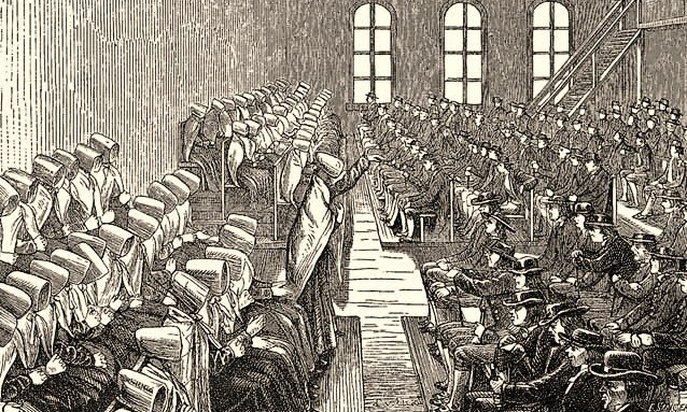"Everyone should be quick to listen, slow to speak, and slow to become angry." --James 1:9
These observations are from my own experiences in the past three years of membership in an unprogrammed Quaker Community. Unprogrammed Quakers have no pastors, typically worship in silence until anyone among them is called by Spirit to speak, and usually function in committees to conduct the activities a pastor would normally perform. I am trying to express simply some of the practices these Quakers use to move from contemplative listening to God's voice to acting as his hands and feet in the world. The following statements about Quaker practices are only based on my experiences and from instruction and eldering I have recieved, and at this time have not been endorsed by representative Quaker groups. I am conveying them here as an invitation to those who are unfamiliar to discover more about Quaker traditions.
The Ragamuffin film frames Richard Mullins' life in terms of his struggles, and while it pretty much affirms he could be a jerk--and who isn't, sometimes? it falls short of describing how he became such an effective agent for God in a fallen world. I hope to convey an alternate way of viewing some of the practical steps of service taken by Rich Mullins, who has recently been discovered to have had Quaker immigrant ancestry on both his mothers' and his fathers' sides.* Perhaps you will recognize his one-on-one style of listening in love, his "step by step" approach to following God's call, his accountability to a committee very much like the "anchoring committees" described here, his habit of traveling paired with a spiritual partner--like Christ's disciples, like St. Francis, like the seventeenth century Quakers, and more recently, like contemporary Quakers.
Present-day Quakers are beginning to re-discover the profound effectiveness of carrying out these spiritual practices of seventeenth-century Quakers--steps, which we hope, may lead to bringing the Kingdom of Heaven down to Earth more fully. It's not necessary to be a Quaker to learn from these practices. Perhaps you will find something useful here, too.
The Quaker practice of listening begins with listening in silence for Spirit, our Inner Teacher, to speak to our hearts. When all the distractions of media, cell phones, texting and facebook scream for our attention so loud we barely have time to hear God, that's when we need silence the most. Quakers practice silent listening both at home during the week and at their morning meetings on First Day (that's Sunday).
Next, we listen to one another in spiritual friendship, This relationship between Friends is kept free of hierarchy or competition--we don't consider either of us more important than the other, acknowledging that God speaks to all of us. We can hear him through our spiritual friends if we are open to his presence "wherever two or more are gathered in his name." Quakers highly prefer face-to-face listening to telephone conversations or other means of contact. Deep listening is practiced by clearing space.
When we are clearing space, we let go of all our preconceptions and expectations when we listen to our spiritual friend. We disregard any personal gain, status or benefit we might derive from our spiritual friend so we can remain objectively open to God's call. We are effectively clearing space when our inner vision begins to unfold the wonder of a universe full of potential. We don't give our friend direction at these times, but by gentle questioning prompt him or her to listen to the "Teacher Within."
Over time, the friend who is practicing listening in silence and deep listening with another friend may begin to experience a concern.
When we have a concern, our attention begins to focus more and more on some practical matter not right with the world. Our intention moves toward taking steps to counter this obstacle to bring God's kingdom more fully to earth. Still, it requires more discernment, the contributing gifts of others, and often much time, to determine which gifts we are to use on our journey and to discover the practical steps we need to take.
Clearness committees will be assembled at the request of a friend to assist in discernment. The committee's contributions seldom offer specific direction. Instead the members of the committee offer open-ended queries which refer the friend to his or her inner teacher. Sometimes, the individual who has called the committee becomes convinced over time of a particular leading--a specific calling by God--to act on his or her concern.
The key to acknowledging and unfolding the individual's spiritual gifts to be used for the benefit of the Quaker community or the larger world is eldering, a term more descriptive of specific incidents of activity than permanent status or hierarchy. Any man or woman in the Quaker community can act as an elder, as long as the person taking on the role is known to have a gift for it. Occasionally eldering involves correcting, but more consistently, the productive work of an elder is to recognize and verbally acknowledge the gifts of individuals within the community. This is not a long-winded or highly directive discourse. More often, an elder in a public setting will look into a friend's eyes and briefly announce, "You have a gift," leaving the friend to further reflect and commune with Spirit. Sometimes the gift is named more specifically, either publicly or privately. The elder also extends oversight to a friend who is in the process of learning to use a gift. Elders temporarily selected for the role also accompany traveling ministers and provide practical, emotional, and spiritual support during their journey. If vocal ministry is to be given, the elder will be present to sit and hold the minister in prayer during this time.
Quakers have anchors, too, in the form of a committee called an anchoring committee. A friend whose calling is acknowledged by his local Quaker community, and whose work will take him to distant areas, is called a traveling minister. He or she can request an anchoring committee to work with him on understanding and acting on his calling, and carrying it out. The anchoring committee will hold the traveling minister accountable for his or her work in the world, manage financial details of the ministry, and support the work of the traveling minister in silent prayer and deep listening. The anchoring committee does not often offer direction in decision-making, but refers the traveling minister to the Teacher Within and asks him/her questions to help surface the next steps to be taken in the ministry. Quaker traveling ministers are not sent alone, but like Christ's disciples, travel by twos. The traveling minister will be sent out with an elder appointed by the anchoring committee. Traditionally, traveling ministers do not accept financial compensation from the Quaker communities they visit, other than reimbursement for the cost of travel. This frees the traveling minister to speak at the direction of Spirit unhampered by the need to placate the more wealthy members of the distant community.
*Richard's immigrant ancestors would have followed these practices, and although he may have learned them from oral tradition in his family, many Indiana Quaker meetings hired ministers following the Great Awakening.
Contemporary Quakers, with few exceptions, wear contemporary clothing, and men and women sit together in meeting. We sit in a circle or a rectangle facing inward, to indicate our belief that all are equal in God's eyes, and all alike can be called to speak by Spirit. Meeting Houses are still typically unadorned, to focus us within.
This is the sixth in a series of posts about the upcoming book, Let the Mountains Sing. The seventh is here.


 RSS Feed
RSS Feed
